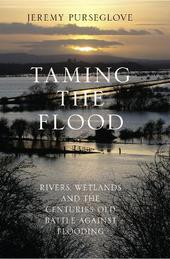
|
Taming the Flood: Rivers, Wetlands and the Centuries-Old Battle Against Flooding
Hardback
Main Details
| Title |
Taming the Flood: Rivers, Wetlands and the Centuries-Old Battle Against Flooding
|
| Authors and Contributors |
By (author) Jeremy Purseglove
|
| Physical Properties |
| Format:Hardback | | Pages:400 | | Dimensions(mm): Height 240,Width 159 |
|
| Category/Genre | Conservation of the environment |
|---|
| ISBN/Barcode |
9780008129354
|
| Classifications | Dewey:333.9180941 |
|---|
| Audience | |
|---|
| Illustrations |
100 b/w illus, (4-page colour plate section)
|
|
Publishing Details |
| Publisher |
HarperCollins Publishers
|
| Imprint |
William Collins
|
| Publication Date |
30 July 2015 |
| Publication Country |
United Kingdom
|
Description
In recent years the Somerset Levels suffered from the worst flooding in over twenty years. Inevitably the residents asked for more drainage, more dredging and more money. Flooding in the area has been an issue since it was a marshland, but is more drainage and more dredging the answer? Exploring the old arguments and new solutions raised over the last 400 years, this completely updated edition of the classic Taming the Flood reveals how harnessing nature, rather than attempting to repress it, is the only answer. As a practical landscape architect and ecologist working in the water industry, Jeremy Purseglove has been actively involved in land drainage engineering to try to enhance, rather than destroy, the heritage of our rivers and wetlands. Taming the Flood draws extensively on this experience, analysing many of the conflicting demands made on rivers and wetlands. Purseglove charts the conservation, agriculture and development, and outlines practical proposals for the protection and use of these sensitive ecological habitats. From the Lancashire mosses and the Derwent Ings, Otmoor and the Fens, to Romney Marsh and the Somerset Levels, he traces the history and natural history of our rivers and wetlands, describing in vivid detail both the beauty of these strange and ancient landscapes, and the often disastrous results of attempts to tame them.
Author Biography
Jeremy Purseglove helped to pioneer a new approach to the way we manage our rivers, having worked as an environmentalist in the water industry for over a decade. Taming the Flood, first published in 1988, is based on his personal experience and on the research he did for a television series, which he also presented. In 1989 he left the water industry to join an engineering consultancy. In this capacity he worked in the UK and throughout the world integrating civil engineering schemes with the environment. He lives in Cambridge.
Reviews'His original determination remains the driving force of this compelling book. Mr Purseglove's mission was to show why rivers really matter to England and how our wetlands are a vital part of the natural scene. His descriptions are wonderfully accurate, his writing captivating and his enthusiasm catching. On any level, it's a good read, but, as a call to action, it's outstanding [...] It is his love of the subject, his deep knowledge and poetic insight that wins us from the very first page.' John Selwyn Gummer, Country Life magazine 'Taming the Flood most deserves its status as a classic [...] for its evocation of place [...] the descriptions of wetlands are exquisitely written. This fine book calls for, and takes, a longer view.' The Sunday Times Praise for the previous edition: 'Jeremy Purseglove has a gift that is increasingly rare in these days of scientific specialisation - of joining practical wisdom about working with nature and the land to an imaginative appreciation of their place in our history and culture.' Richard Mabey 'A most authoritative book which appears at a very appropriate time. It will give rise to new attitudes in an extremely important aspect of conservation, and new hope to those who are fighting for a more enlightened approach to wetlands.' Sir Peter Scott 'Written with passion and scholarship, Taming the Flood is not only about landscapes - ranging from the secret brooks of Shakespeare country to the windswept Norfolk marshes - but also combines ecology, history, literature and politics in order to explain why our rivers and wetlands matter and the ways in which they are under threat.' Tony Soper
|